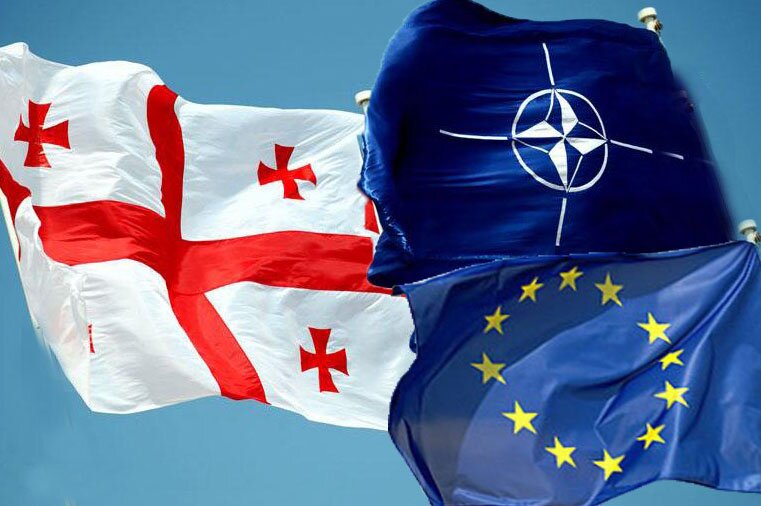
In preparation for the “Eastern Partnership” summit, the European Union is paying special attention to Georgia. After all, compared to other post-Soviet countries, it has many problems. First of all, due to Russia's imperial neo-politics. But it should be noted that this is compensated by the best indicators of Georgia in its processes of European integration.
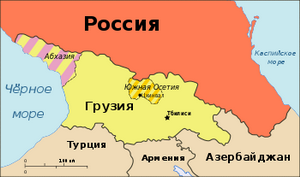 |
|
The Russian leadership took control of at least one third part of Georgian territory http://ru.wikipedia.org/ |
If we talk about the latest bilateral Russian-Georgian relations, the Russian leadership, having provoked conflicts in 1992 and 2008 in Abkhazia and Southern Ossetia, took control of at least the third part of Georgian territory. And now, trying to gain a foothold there, it intentionally impedes settlement of Georgian-Abkhazian and Georgian-Ossetian conflicts, in particular, by providing comprehensive support to the breakaway republics. Providing political, financial, economic and military aid to the separatist regimes of Abkhazia and Southern Ossetia (and recognizing their “independence”), the Russian government at the same time has turned its back on international organizations (UN, OSCE and EU), that are trying to learn and analyze the state of affairs in these critical regions. On top of it all, Russians are blocking Georgian initiatives under the Geneva consultations on security issues in the Southern Caucasus.
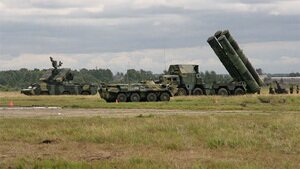 |
|
Russia has deployed S-300 in the Tskhinvali region — Minister of Foreign Affairs of Georgia http://newsgeorgia.ru/ |
Despite the 2008 “Medvedev-Sarkozy” peace agreements, Russia not only refuses to withdraw its troops from the territory of Abkhazia and Southern Ossetia, but, on the contrary, increases its military presence there. Today, the Russian military bases located in the breakaway republics within Georgia, have armored vehicles and artillery systems for different purposes, combat aircraft and attack helicopters, modern Air Defense systems, including S-300. The maritime space in the region of Abkhazia is controlled by the guard and percussion rocket ships of the Black Sea Fleet of the Russian Federation. Russia does not conceal that this way it is trying to achieve its strategic goals — to strengthen Russia's positions in the Black Sea region and the Caucasus, to disrupt the process of European integration of Georgia. Thus, speaking in November 2011 at the Headquarters of the 58th Army of the RF Military Forces in Vladikavkaz, the Russian President (Dmitry Medvedev at the time) directly explained the reason for the Russias' military aggression against Georgia in 2008: to prevent Georgia's joining NATO.
However, contrary to this Russia's pressure, despite the contradictions between Georgian political forces caused by the recent change of government in the country, the Georgian government does not change its clear course of European and Euro-Atlantic integration. This was confirmed by the Prime Minister of Georgia B. Ivanishvili at the press conference on 3d July this year, when he outlined the main directions of domestic and foreign policy of their government. According to him, the main priority of Georgia remains further implementation of the European and Euro-Atlantic choice of the Georgian nation, determined by the referendum in 2008 (more than 70% of Georgian citizens were in favor of joining the EU and NATO).
It is appropriate to note that, resuming relations with Russia, B. Ivanishvili denied the possibility of Georgia's return to CIS as such, as it does not meet the country's interests.
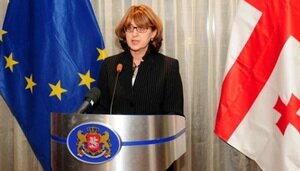 |
|
In Batumi the international conference “European Way of Georgia” took place. Minister of Foreign Affairs of Georgia Maia Pandzhikidze made a speech before the participants http://www.vestikavkaza.ru/ |
In such a “key” is going on the preparation of Georgia to the summit of “Eastern Partnership” of the EU, which will be held this November in Vilnius. Thus, on July 11-12, in the Georgian city of Batumi, took place an international conference “European Way of Georgia”. It was attended by EU Commissioner for Enlargement and European Good Neighborly Relations Policy Stefan Fule, as well as by the Foreign Ministers of Bulgaria, Slovakia and Estonia. At the conference, representatives of the EU pointed out positive achievements of Georgia in preparation for the European integration.
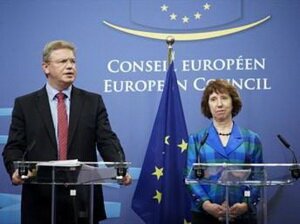 |
| The EU Commissioner for Enlargement and Good Neighborly Relations Stefan Fule and Head of European diplomacy, Catherine Ashton: the completion of the negotiations on the Association Agreement was a “very important milestone” in relations between the parties EU-Georgia http://www.enpi-info.eu/ |
July 22 this year, after summing up the meeting between the Minister of Economy and Development of Georgia G. Kvirikashvili with representatives of the European Union in Brussels, it was announced about the finalization of the agreement on the establishment of a free trade area between the EU and Georgia. The document provides for the opening of borders between member countries of the European Union and Georgia for goods and services, including abolition of customs and tariff barriers. According to experts, this will increase Georgian exports to the EU by at least 10%, and imports from the European Union to Georgia — by more than 7%. As a result, Georgia's GDP will grow by 4%.
Georgia constantly coordinates its actions and exchanges experience of European integration with other countries. In particular, on July 11-12, Georgian President Mikhail Saakashvili participated in the conference of Heads of States and Governments of the member countries of the “Eastern Partnership” in Chisinau in the format of the European People's Party. They discussed cooperation between the parties in preparation of the EU summit in Vilnius, analyzed the effectiveness of the EU assistance in strengthening Georgia's statehood and democratic choice, enhancing border security, and other aspects of bilateral and multilateral cooperation in the political, economic, humanitarian and security spheres. At the same time, Georgian President Mikhail Saakashvili focused on the negative role of Russia, which provokes regional conflicts in the post-Soviet space.
Besides, cooperation between Georgia and NATO is getting stronger.
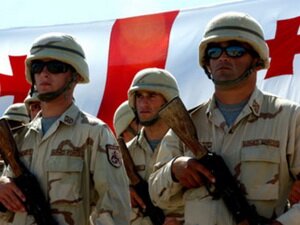 |
| NATO and Georgia have discussed the future cooperation in Afghanistan http://www.trend.az/ |
July 15, 2013, Georgian Defense Minister I. Alasania unveiled the main aspects of the state policy in the sphere of defense, providing, in particular, inclusion of Georgian Military Units into the Rapid Reaction Force of the Alliance (by 2015), as well as the Georgian Armed Forces' participation in the NATO's operations abroad.
For example, the Georgian side is ready to participate in the new NATO operation in Afghanistan, “Strong Support” by giving a battalion task force — up to 700 soldiers, and medical personnel and officers – instructors for artillery, flight and engineer training. They also are considering the issue of training Afghan military servicemen in military educational institutions of Georgia.
The above mentioned achievements in the issue of Georgia's European and Euro-Atlantic integration became possible thanks to a coherent and effective policy of the Georgian leadership, clearly sticking to the chosen course of national development. And it is very important that Georgia has achieved de facto independence from Russia in the energy, economic and trade spheres. In particular, after the termination of the Russian-Georgian relations in 2008, Georgia managed to secure its energy needs through the supply of Azerbaijani oil and gas. Tbilisi's foreign trade is also orientated to other countries, including Azerbaijan, Turkey, the EU and the USA.
A great positive role in the rapprochement between Georgia and Western countries and international organizations, plays the constructive dialogue between the “Georgian Dream” block (supports Prime Minister B. Ivanishvili) and the opposition party “United National Movement” (supports President Mikhail Saakashvili). In particular, during the meeting of B.Ivanishvili with the leader of the Parliamentary minority D. Bakradze in July, there was reached an agreement on involving opposition in the creation of the State Constitutional Commission, on termination of the pursuit by government of President Saakashvili's supporters, on resuming participation of the Parliamentary opposition in the work of the supreme legislative body, as well as on consultations between the government and the opposition on a regular basis.
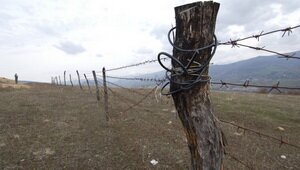 |
| Ministry of Foreign Affairs of Georgia claims that Russian border guards have installed fences with barbed wire on the border between Southern Ossetia and Georgia, in some areas the line of the border has been transferred into Georgia's territory РИА Новости http://ria.ru/ |
Trying to actively oppose such constructive processes, the Russian leadership has resorted to new, more sophisticated methods of pressure on Georgia. In particular, Russia provokes a rise in tensions over the Georgian-Abkhazian and Georgian-Ossetian conflict, unilaterally increasing the protection of the administrative borders of the breakaway republics. For example, the line of the border of Southern Ossetia has been wrongly transferred by Russia into Georgian territory, so that there was another conflict situation in the Georgian-Russian relations which also worsened living conditions of the local population, which focuses on cross-border trade.
It is characteristic that Russia used this action in spring of this year, at the time when the leadership of Georgia was actively trying to establish a two-way relationship. By the way, Moscow made the resumption of trade and economic cooperation directly dependent on the position of Tbilisi in the issues of its European and Euro-Atlantic integration, as well as demanded to transfer Georgia's energy infrastructure under Russian control.
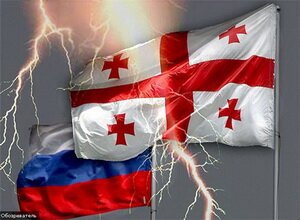 To discredit the Georgian state in the eyes of the world community, as well as to prevent the development of Georgian-American relations, Moscow accused Tbilisi of “spreading epidemic of African swine fever in the Russian territory” arguing that “the plague viruses are produced in Georgia, in the located there bacteriological laboratory of the U.S. Navy”. Without taking into consideration the explanation of the Georgian side concerning purely medical nature of the laboratory, as well as ignoring the agreement on letting Russian experts to the laboratory, Russia ceases to express its “concern”. In particular, systematic statements about this makes the Head of Russian Epidemiology Control — the Chief State Sanitary Doctor of Russia Gennady Onishchenko, who has already taken on the role of conductor of the Russian policy of pressure on the countries of the former Soviet Union.
To discredit the Georgian state in the eyes of the world community, as well as to prevent the development of Georgian-American relations, Moscow accused Tbilisi of “spreading epidemic of African swine fever in the Russian territory” arguing that “the plague viruses are produced in Georgia, in the located there bacteriological laboratory of the U.S. Navy”. Without taking into consideration the explanation of the Georgian side concerning purely medical nature of the laboratory, as well as ignoring the agreement on letting Russian experts to the laboratory, Russia ceases to express its “concern”. In particular, systematic statements about this makes the Head of Russian Epidemiology Control — the Chief State Sanitary Doctor of Russia Gennady Onishchenko, who has already taken on the role of conductor of the Russian policy of pressure on the countries of the former Soviet Union.
A separate area of Russian influence is mediated provoking a conflict between the branches of the Georgian leadership through active coverage in the Russian media of the contradictions in the government of Georgia.
Despite the Russian pressure, at the end of July this year Georgian Prime Minister B. Ivanishvili confirmed again that Tbilisi, having chosen the European direction, considers it the foundation of the country's foreign policy.

